-
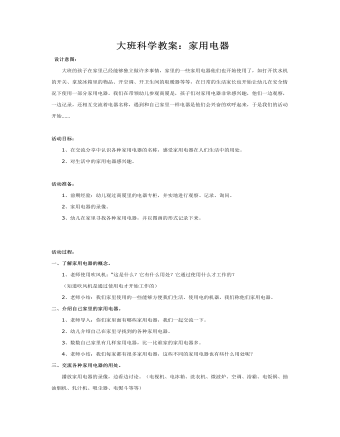
大班科学教案:家用电器
活动目标:1、在交流分享中认识各种家用电器的名称,感受家用电器在人们生活中的用处。2、对生活中的家用电器感兴趣。 活动准备:1、前期经验:幼儿观过商厦里的电器专柜,并实地进行观察、记录、询问。2、家用电器的录像。3、幼儿在家里寻找各种家用电器,并以图画的形式记录下来。 活动过程:一、了解家用电器的概念。1、老师使用吹风机:“这是什么?它有什么用处?它通过使用什么才工作的? (知道吹风机是通过使用电才开始工作的)2、老师小结:我们家里使用的一些能够方便我们生活、使用电的机器,我们称他们家用电器。二、介绍自己家里的家用电器。1、老师导入:你们家里面有哪些家用电器,我们一起交流一下。2、幼儿介绍自己在家里寻找到的各种家用电器。3、数数自己家里有几样家用电器,比一比谁家的家用电器多。4、老师小结:我们每家都有很多家用电器,这些不同的家用电器也有些什么用处呢?三、交流各种家用电器的用处。 播放家用电器的录像,边看边讨论。(电视机、电冰箱、洗衣机、微波炉、空调、浴霸、电饭锅、抽油烟机、轧汁机、吸尘器、电熨斗等等)1、这是什么?有什么用处?2、它们的形状、颜色一样吗?为什么要不一样?(满足人们不同的喜好)3、随机提问:你同意他的说法吗?还有什么意见?4、你们还有什么问题吗?可以提出来大家一起讨论?5、老师小结:家用电器用处可真大,它们给我们生活带来了方便。
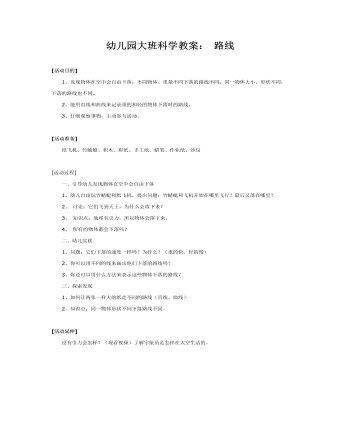
幼儿园大班科学教案: 路线
[活动准备] 纸飞机、竹蜻蜓、积木、彩纸、手工纸、蜡笔、作业纸、沙包 [活动过程] 一、引导幼儿发现物体在空中会自由下落1、幼儿自由玩竹蜻蜓和纸飞机,提出问题:竹蜻蜓和飞机开始在哪里飞行?最后又落在哪里?2、讨论:它们飞到天上,为什么会落下来?3、知识点:地球有引力,所以物体会落下来。4、所有的物体都会下落吗?
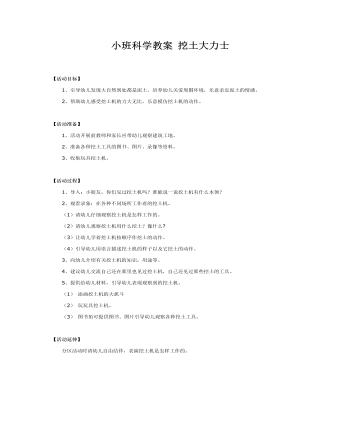
小班科学教案 挖土大力士
【活动准备】1、活动开展前教师和家长应带幼儿观察建筑工地。2、准备各种挖土工具的图书、图片、录像等资料。3、收集玩具挖土机。 【活动过程】1、导入:小朋友,你们见过挖土机吗?谁能说一说挖土机有什么本领?2、观看录象:在各种不同场所工作着的挖土机。 (1)请幼儿仔细观察挖土机是怎样工作的。 (2)请幼儿观察挖土机用什么挖土?像什么? (3)让幼儿学着挖土机按顺序作挖土的动作。 (4)引导幼儿用语言描述挖土机的样子以及它挖土的动作。
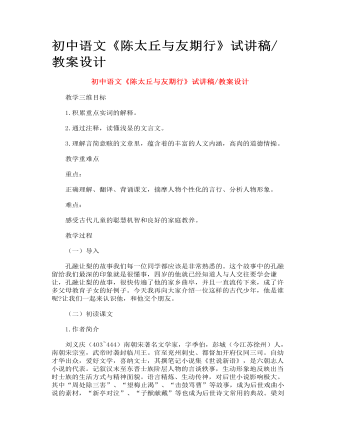
初中语文《陈太丘与友期行》试讲稿_教案设计
刘义庆(403~444)南朝宋著名文学家,字季伯,彭城(今江苏徐州)人,南朝宋宗室,武帝时袭封临川王。官至兖州刺史、都督加开府仪同三司。自幼才华出众,爱好文学,喜纳文士,其撰笔记小说集《世说新语》,是六朝志人小说的代表。记叙汉末至东晋士族阶层人物的言谈轶事,生动形象地反映出当时士族的生活方式与精神面貌。语言精炼、生动传神,对后世小说影响极大。其中“周处除三害”、“望梅止渴”、“击鼓骂曹”等故事,成为后世戏曲小说的素材,“新亭对泣”、“子猷献戴”等也成为后世诗文常用的典故。梁刘孝标作注,旁征博引,为后人所重。另有《幽明录》,今佚。鲁迅《古小说钩沉》辑其佚文200余条,皆记诡异之事。
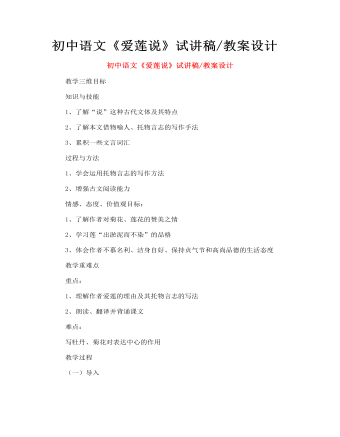
初中语文《爱莲说》试讲稿_教案设计
初读课文 了解文体,熟悉作者 文章的题目是《爱莲说》“爱”表现了作者的感情,“莲”是这篇文章写作的主体,“说” 在这里指什么? 明确:“说”是一种文体,可以说明事物,也可以发表议论或记叙事物 “说”这种文体可以灵活地运用说明、记叙和议论的表达方式,偏重于议论那么题目的意思是什么呢?可以理解为“谈谈爱莲花的道理”或“说说喜爱莲花的道理” 他爱莲花有什么道理呢?大家在学习课文中一定要开动小脑筋 本文作者周敦颐 ,(10171073) ,宋代道洲(现在湖南省道县)人,字茂叔,哲学家因他世居道县濂溪,后居庐山莲花峰前,峰下有溪,也命名为濂溪,学者就称他为“濂溪先生”
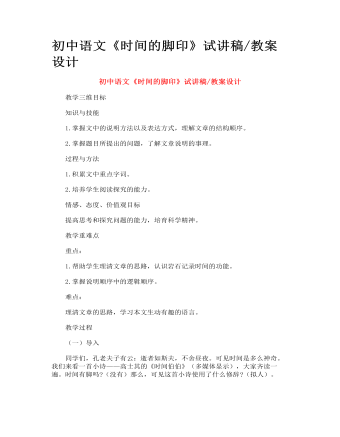
初中语文《时间的脚印》试讲稿_教案设计
同学们,孔老夫子有云:逝者如斯夫,不舍昼夜。可见时间是多么神奇。我们来看一首小诗——高士其的《时间伯伯》(多媒体显示),大家齐读一遍。时间有脚吗?(没有)那么,可见这首小诗使用了什么修辞?(拟人)。 我们今天学习的课文文题就源于高士其这首小诗。(板书课题:8.时间的脚印)这课题也采用什么修辞?(拟人)这是一篇科普作品,了解一下它的作者( 看图了解陶世龙)。先来欣赏图片,第一张自然界中的沉积岩、第二张“恐龙化石”、第三张“三叶虫化石”。(屏幕显示)。我们看到的这些岩石,在保存古代生物的同时,还记下了时间的痕迹。那么,岩石是怎样记录时间的呢?带着这个问题,我们一起来学习《时间的脚印》。我们来看看这节课的学习目标。
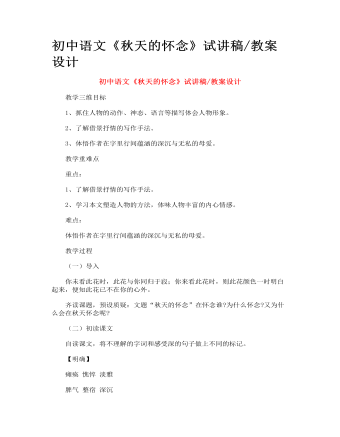
初中语文《秋天的怀念》试讲稿_教案设计
深层探究 在那个树叶“刷刷拉拉”飘落的季节里,母亲离我远去了。我怀念我的母亲,怀念她为我付出的艰辛,为我承受的苦痛和她给予我的爱。除此,母亲还给了我更为宝贵的东西,那是什么? 【明确】:是母亲交给我的生活态度,价值观,她让我有了直面苦难的勇气、信心和力量。 这世间有很多东西,当我们懂得珍惜,回头却发现他已经不在了。比如说光阴、健康、生命、亲情、友情…… 史铁生和母亲的故事,史铁生“好好活”的人生一定让你有所触动,有些问题你可能没有想过,有些话你也没有说过,因为你还拥有着。 (让学生充分展示,说出自己的心里话。) 小结:这是一位病入膏肓的母亲,一位苦难坚忍的母亲;这是一位强大智慧的母亲,一位大爱无声的母亲!这个母亲养育了我,陪伴了我,成就了我。 天底下每一位母亲都同样伟大。她们为儿女同样倾我所有,操尽心机;她们同样青丝白发,毫无保留。
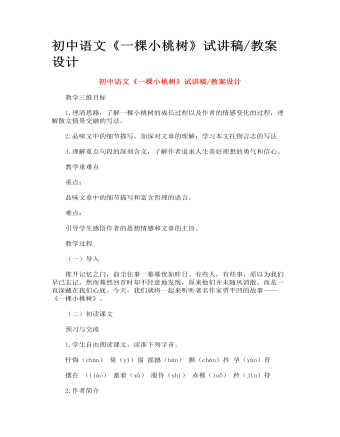
初中语文《一棵小桃树》试讲稿_教案设计
贾平凹,1952年2月21日生于陕西省商洛市丹凤县棣花镇,当代作家。 1974年开始发表作品。1975年毕业于西北大学中文系。1978年凭借《满月儿》,获得首届全国优秀短篇小说奖。1982年发表作品《鬼城》《二月杏》。1992年创刊《美文》。1993年创作《废都》。20**年,先后担任西安建筑科技大学人文学院院长、文学院院长。20**年凭借《秦腔》,获得第七届茅盾文学奖。20**年凭借《古炉》 ,获得施耐庵文学奖。20**年3月22日,澳门大学向贾平凹颁授了荣誉博士学位。
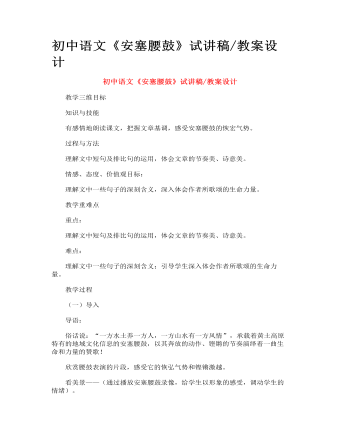
初中语文《安塞腰鼓》试讲稿_教案设计
精读课本,贯通全文 提问:整篇文章极富震撼力,文章中一个排比接一个排比,一个高潮连一个高潮,大家从中体味到了什么? 明确: A、这是一篇歌颂激荡的生命和磅礴的力量的文章。 B、全文洋溢着一种阳刚之美。 C、表现要冲破束缚、阻碍的强烈渴望。 朗读赏析探究 赏美图,配佳句——为了让大家对被誉为“天下第一鼓”的安塞腰鼓有更直观的认识,我们再来看几组特写照片。看后请各小组用课文中的文句与之相配并高声朗读。 明确:对排比句进行总结,说出对句子的理解。 怎样理解“耳畔是一声渺远的鸡声”? ①鸡啼预示天明,是新的一天的开始,是希望的象征。 ②这是以声衬静,用鸡啼反衬火烈的鼓声停止后大地的寂静。 说美点,品美韵——这篇文章美吗?美在哪里? 语言美: 课文多用短句来表现内容;大量运用排比,有句内、句与句、段与段之间的排比,交错出现,连用许多。
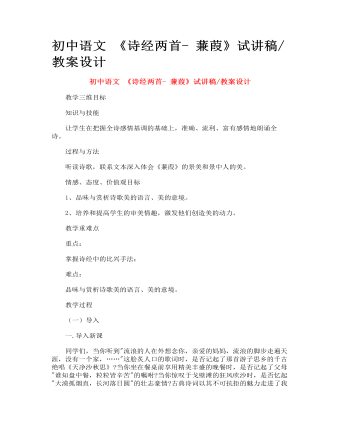
初中语文 《诗经两首- 蒹葭》试讲稿_教案设计
同学们,当你听到"流浪的人在外想念你,亲爱的妈妈,流浪的脚步走遍天涯,没有一个家,……"这脍炙人口的歌词时,是否记起了那首游子思乡的千古绝唱《天净沙秋思》?当你坐在餐桌前享用精美丰盛的晚餐时,是否记起了父母"谁知盘中餐,粒粒皆辛苦"的嘱咐?当你惊叹于戈壁滩的狂风吹沙时,是否忆起"大漠孤烟直,长河落日圆"的壮志豪情?古典诗词以其不可抗拒的魅力走进了我们的生活,为我们的生活增添了更多的美丽与奇妙。今天,让我们一起学习《蒹葭》这首诗歌,再一次用诗歌滋润我们渴求的心灵。
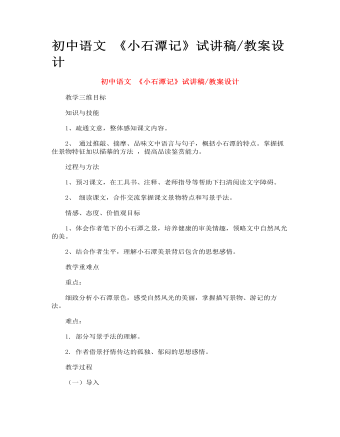
初中语文 《小石潭记》试讲稿_教案设计
大家都知道,在中国文学史上有不少的文人用他们的笔墨描写过优美的山水,比如说我们以前学过: 唐 杜牧《江南春》: 千里莺啼绿映红,水村山郭酒旗风。南朝四百八十寺,多少楼台烟雨中。 杜甫《望岳》:岱宗夫如何? 齐鲁青未了。造化钟神秀,阴阳割昏晓。 荡胸生层云, 决眦入归鸟。 会当凌绝顶, 一览众山小。 郦道元在《三峡》中也有“春冬之时,则素湍绿潭,回清倒影。”这样引人入胜的景色。可以说优美的山水诗文不可枚举,那么今天让我们跟随柳宗元一起走进小石潭,看看又是怎样的一幅山水画呢?他又是怎样的心情写下这篇游记的呢?
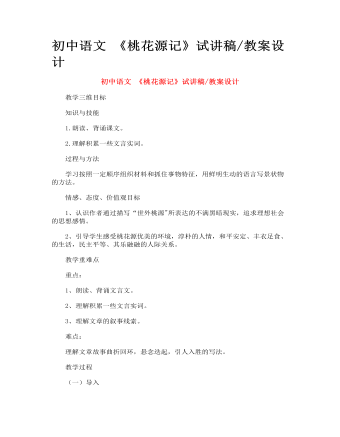
初中语文 《桃花源记》试讲稿_教案设计
陶渊明生于东晋末朝,出身于没落的地主官僚家庭。他少时颇有壮志,博学能文,任性不羁。当时社会动乱不安,他有志不得展。做过小官,由于不满官场的丑恶,弃官回乡,这时他四十一岁,从此过着“躬耕自资”的隐居生活。忧愤、饥寒、劳累、赢疾一起折磨着他,六十三岁去世。后称靖节先生。他所作的诗文,内容多描写农村生活,表现了优美的自然风光,抒发他热爱田园生活、乐于和农民来往和不愿与统治者同流合污的高尚感情;但也包含了乐天知命、消极适世的因素。在形式上一反当时华而不实的文风,明朗清新,质朴自然,善于抓住客观事物最突出的特征,淡淡几笔传神的表现它的形象,简洁含蓄而富有韵味,对后代作家有较大的影响。本文写作年代大约是宋永初二年(421年),其时陶渊明已经五十七岁了。他拒绝同刘格的来政权合作,不满黑暗的政治现实,同时由于他和农民接近,理解他们追求理想社会的愿望,所以写了这篇记和诗。
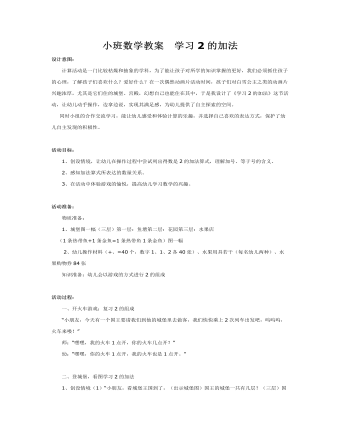
小班数学教案 学习2的加法
活动目标:1、创设情境,让幼儿在操作过程中尝试列出得数是2的加法算式,理解加号、等于号的含义。2、感知加法算式所表达的数量关系。3、在活动中体验游戏的愉悦,提高幼儿学习数学的兴趣。 活动准备: 物质准备:1、城堡图一幅(三层)第一层:鱼塘第二层:花园第三层:水果店 (1条热带鱼+1条金鱼=1条热带鱼1条金鱼)图一幅 2、幼儿操作材料(+、=40个,数字1、1、2各40张)、水果用具若干(每名幼儿两种)、水果购物券84张 知识准备:幼儿会以游戏的方式进行2的组成

校长在高三九月调考总结表彰暨高考备考动员大会上的讲话
四、坚持不懈奋斗路虽远,行则将至;事虽难,做则必成。高考竞争激烈,备考过程艰辛,需要同学们坚持不懈奋斗,全力以赴战胜备考的枯燥、困难、压力、挫折和疲倦!希望同学们把握好每一天的学习,深耕细作,重基础、重能力、重教材、重错题。认真上好每一节课,完成好每一次作业,破解好每一个问题,落实好每一天自主补短的学习任务,努力争取对各学科的学习达到“点点清、节节清、周周清”的目标。希望同学们重视每一次半月考试和重大考试,利用考试实战训练机会,巩固基础知识,提升学科能力,暴露并解决学习问题,训练应考心态,探索应考策略,提高应考能力。希望同学们珍惜宝贵时间,讲究学习和应考方法,真抓实干,苦干巧干,孜孜不倦,久久为功,不懈奋斗。
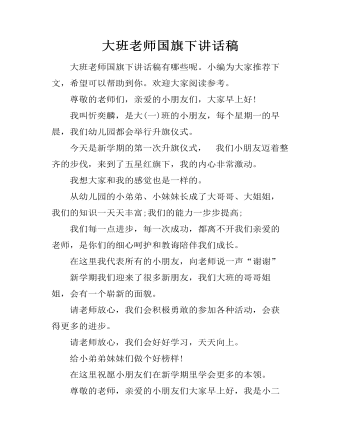
大班老师国旗下讲话稿
大班老师国旗下讲话稿有哪些呢。小编为大家推荐下文,希望可以帮助到你。欢迎大家阅读参考。尊敬的老师们,亲爱的小朋友们,大家早上好!我叫忻奕麟,是大(一)班的小朋友,每个星期一的早晨,我们幼儿园都会举行升旗仪式。今天是新学期的第一次升旗仪式, 我们小朋友迈着整齐的步伐,来到了五星红旗下,我的内心非常激动。我想大家和我的感觉也是一样的。从幼儿园的小弟弟、小妹妹长成了大哥哥、大姐姐,我们的知识一天天丰富;我们的能力一步步提高;我们每一点进步,每一次成功,都离不开我们亲爱的老师,是你们的细心呵护和教诲陪伴我们成长。在这里我代表所有的小朋友,向老师说一声“谢谢”新学期我们迎来了很多新朋友,我们大班的哥哥姐姐,会有一个崭新的面貌。请老师放心,我们会积极勇敢的参加各种活动,会获得更多的进步。请老师放心,我们会好好学习,天天向上。给小弟弟妹妹们做个好榜样!在这里祝愿小朋友们在新学期里学会更多的本领。
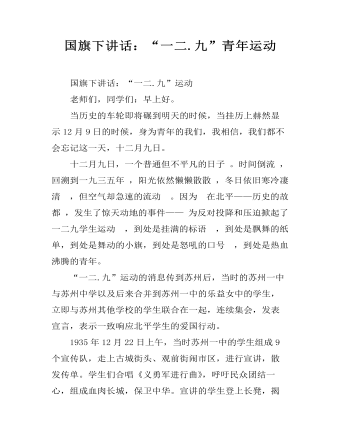
国旗下讲话:“一二.九”青年运动
国旗下讲话:“一二.九”运动老师们,同学们:早上好。当历史的车轮即将碾到明天的时候,当挂历上赫然显示12月9日的时候,身为青年的我们,我相信,我们都不会忘记这一天,十二月九日。十二月九日,一个普通但不平凡的日子 。时间倒流 ,回溯到一九三五年 ,阳光依然懒懒散散 ,冬日依旧寒冷凄清 ,但空气却急速的流动 。因为 在北平——历史的故都 ,发生了惊天动地的事件—— 为反对投降和压迫掀起了一二九学生运动 ,到处是挂满的标语 ,到处是飘舞的纸单,到处是舞动的小旗,到处是怒吼的口号 ,到处是热血沸腾的青年。“一二.九”运动的消息传到苏州后,当时的苏州一中与苏州中学以及后来合并到苏州一中的乐益女中的学生,立即与苏州其他学校的学生联合在一起,连续集会,发表宣言,表示一致响应北平学生的爱国行动。1935年12月22日上午,当时苏州一中的学生组成9个宣传队,走上古城街头、观前街闹市区,进行宣讲,散发传单。学生们合唱《义勇军进行曲》,呼吁民众团结一心,组成血肉长城,保卫中华。宣讲的学生登上长凳,揭发蒋介石政府在北平镇压学生,与日本帝国主义达成妥协的罪行。学生们讲得声泪俱下,而有自行车的学生则担任联络员,传递消息。

新人教版高中英语必修3Unit 1 Festivals and celebrations-Discovering Useful Structure教学设计
4.That was an experience that frightened everyone. →That was _____________________. 答案:1. taking 2. being discussed 3. in the reading room 4. a frightening experienceStep 6 The meaning and function of V-ing as the predicative动词-ing形式作表语,它通常位于系动词后面,用以说明主语“是什么”或“怎么样”一种表示主语的特质、特征和状态, 其作用相当于形容词; 另一种具体说明主语的内容, 即主语等同于表语, 两者可互换。The music they are playing sounds so exciting. 他们演奏的音乐听起来令人激动。The result is disappointing. 结果令人失望。Our job is playing all kinds of music. 我们的工作就是演奏各种音乐。Seeing is believing. 眼见为实。Step 7 Practice1. It is ________(amaze) that the boy is able to solve the problem so quickly.2. Buying a car is simply _______(waste) money. 3. Please stop making the noise—it’s getting ________(annoy). 4. complete the passage with the appropriate -ing form.La Tomatina is a festival that takes place in the Spanish town Bunol every August. I think many food festivals are __________ because people are just eating. however, this festival is _________ because people don't actually eat the tomatoes. Instead, they throw them at each other! the number of people ________ part in this tomato fight, can reach up to 20,000, and it is a very __________ fight that lasts for a whole hour. The _______ thing is how clean Bunol is after the tomatoes are washed away after the fight. this is because the juice form tomatoes is really good for making surfaces clean!答案:1. amazing 2. wasting 3. annoying4. boring interesting taking exciting amazing

新人教版高中英语必修3Unit 1 Festivals and Celebrations-Reading and Thinking教学设计
The topic of this part is “Discover the reasons for festivals and celebrations.The Listening & Speaking & Talking part aims at talking about the experiences and feelings or emotions about the festivals and celebrations. This section aims at detecting the reason why the people celebrate the festivals, the time, the places, the types and the way of celebrations. It also explains why some traditions in the old celebrations are disappearing, like the firecrackers in the big cities and some new things are appearing like the prosperity of business or commerce. 1. Students can talk about what festivals they know and the reasons and the way of celebrating them.2. Students should learn the reading skills such as the headline and get the topic sentences, the structures of articles.3. Students can understand the past, the present situation of some festival around the world and why there are some changes about them. 4. Students can have the international awareness about the festivals.1. Students should learn the reading skills such as the headline and get the topic sentences, the structures of articles.2. Students can understand the past, the present situation of some festival around the world and why there are some changes about them.Step 1 Lead in---Small talkWhat festival do you like best ? Why ?I like the Spring Festivals because I can set off the fireworks, receive the lucky money and enjoy the Gala with my families.Step 2 Before reading---Pair workWhy do people celebrate different festivals ?The Spring Festivals is to celebrate the end of winter and the coming of spring and new life.The Mid-autumn Day is to celebrate the harvest and admire the moon.

新人教版高中英语必修3Unit 1 Festivals and Celebrations-Listening &Speaking&Talking教学设计
The theme of this section is “Talk about festival activities and festival experiences”.Festival and holiday is a relaxing and interesting topic for students. This part talks about the topic from the daily life of students’. In the part A ---Listening and Speaking, there are three conversations among different speakers from three countries(Japan, Rio and China), where the speakers are participating in or going to participate in the festivals and celebrations. So listening for the relationship among them is a fundamental task. Actually, with the globalization and more international communication, it is normal for Chinese or foreigners to witness different festivals and celebrations in or out of China. In the Conversation 1, a foreign reporter is interviewing a Japanese young girl who just had participated in the ceremony of the Coming-of-Age Day on the street and asking her feeling about the ceremony and the afterwards activities. Conversation 2, Chinese girl Li Mei is witnessing the Rio Carnival for the first time, and her friend Carla gives her some advice on the costumes which enables her to match with the carnival to have a good time. Conversation 3, a Chinese guide is showing a group of foreign visitors around the Lantern Festival and introducing the customs of the festival to them. The three conversations have a strong vitality and insert the festival and cultural elements from different countries. So perceiving the festivals and cultures from different countries is the second task. At the same time, the scripts also insert the targeted grammar --- v-ing as attributive and predicative, which students can perceive and experience in a real context and make a road for the further study. That is the third task. In the Part B--- Listening and Talking, the theme is “Talk about festival experience”, which is the common topic in our daily conversations. During the conversation, Song Lin, a Chinese student, asked Canadian friend Max about how to spend Christmas. In the conversation, Song Lin talked about experience and the feelings during the Chinese Spring Festival, during which there are not only some enjoyable things but some unpleasant things. After the listening, perhaps students find there are some similarities between Christmas and the Chinese Spring Festival as there are some differences in the origins and celebrations. For example, people always visit friends and relatives, decorate their houses, have a big dinner together, chat and give presents to each other.

新人教版高中英语必修3Unit 1 Festivals and Celebrations-Reading for writing教学设计二
Step 3 Analyzing article structureActivity 31. Teachers raise questions to guide students to analyze the chapter structure of this diary and think about how to describe the festival experience. (1)What should be included in the opening/body/closing paragraph(s)?(2)How did the writer arrange his/her ideas?(3)What kind of interesting details did the writer describe?(4)How did the writer describe his/her feelings/emotions during the event?2. Students read and compare the three sentence patterns in activity 2. Try to rewrite the first paragraph of the diary with these three sentence patterns. After that, students exchange corrections with their partners. Such as:●This was my first time spending three days experiencing the Naadam Festival in China’s Inner Mongolia Autonomous Region and it was an enjoyable and exciting experience. ●I'll never forget my experience at the Naadam Festival because it was my first time to watch the exciting Mongolian games of horse racing, wrestling, and archery so closely. ●I'll always remember my first experience at the Naadam Festival in China’s Inner Mongolia Autonomous Region because it was so amazing to spend three days witnessing a grand Mongolian ceremony. Step 4 Accumulation of statementsActivity 41. Ask the students to read the diary again. Look for sentences that express feelings and emotions, especially those with the -ing form and the past participle. Such as:● …horse racing, wrestling, and archery, which are all so exciting to watch. ● some amazing performances● I was surprised to see…● I was a little worried about. . . ● feeling really tiredOther emotional statements:●I absolutely enjoyed the archery, too, but the horse races were my favourite part. ●I'm finally back home now, feeling really tired, but celebrating Naadam with my friend was totally worth it. ●He invited me back for the winter to stay in a traditional Mongolian tent and cat hot pot. I can’t wait!2. In addition to the use of the -ing form and the past participle, the teacher should guide the students in the appreciation of these statements, ask them to memorize them, and encourage them to use them reasonably in writing practice.
